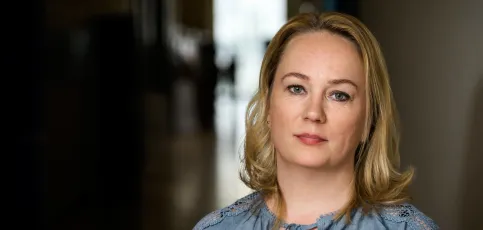
The Icelandic company Controlant has regularly been in the media recently as their products play a key part in monitoring the Pfizer vaccine against COVID-19 currently being distributed all over the world. A less known fact is that the idea for the software and mechanism used for monitoring the vaccine was hatched at the University of Iceland early this century. The company has grown rapidly in recent years and there are prospects for even further growth, according to Gísli Herjólfsson and Erlingur Brynjúlfsson, two of the founders and executives of the company. They took the time from their busy schedule to answer a few questions about the company.
When and where was the idea for Controlant born at the University of Iceland?
We are five founders in total Atli Þór Hannesson, Erlingur Brynjúlfsson, Gísli Herjólfsson, Stefán Karlsson, and Trausti Þórmundsson. Gísli, Erlingur and I met during our studies in the Faculty of Electrical and Computer Engineering at the University of Iceland. Trausti was our supervisor in projects at the University and on the basis of that collaboration we started to experiment in 2004 using wireless technology to solve problems. Atli and Stefán; Gísli's childhood friend were then added to the group that consequently launched the company's operations in 2007 and the first employee starts working full time. We were originally working on solutions using wireless technology to simplify and automate various measurements - such as real-time air pressure in car tires and pressure, humidity and temperature in the building industry.
It was then in 2009 that we took the path we are still on today; providing the pharmaceutical sector with automatic real-time solutions that ensure pharmaceutical quality with registration and monitoring drug temperature along with response services. That year there was H1N1, or the swine flu epidemic, and our technology was used to protect and manage the distribution and storage of the vaccination in Iceland.
What were the main challenges in the company to begin with?
The main challenges to begin with were general product developments and finding the right market for it. Once we were established on the domestic market the next big challenge was to promote our product globally. It was quite an effort to get our foot in the door in many of the largest pharmaceutical companies in the world. This was a road paved with patience and tenacity taken by the company's founders and employees, because when Controlant set out the field was not ready for the changes involved in wireless technology and cloud solutions in gathering measuring data and monitoring products. Today is a new era and more and more companies in pharmaceuticals opt for such solutions.
How did your education from the University of Iceland benefit you in the development of your idea?
The studies in electrical and computer engineering are challenging and many factors in the study programme proved useful in shaping the solutions we offer today, including mechanical development and data processing. The studies, furthermore, were an excellent preparation for the numerous general challenges we have faced since we started down this road and were impossible to foresee.
We worked on our solution for three years when we were still studying and had good access to the extensive knowledge within the University of Iceland.
What would you say was the turning point in the company history, when you saw that it could boom?
You could say that the turning points were more than one. The first one in 2009 with the arrival of the swine flu and the production of a vaccine began which was imported to Iceland and our first big assignment in the pharmaceutical sector was to monitor that vaccine. We made a deal with the Chief Epidemiologist on monitoring all vaccine storages in Iceland. This was the first step into the pharmaceutical sector and we immediately saw the need for a technology that monitors the condition and quality of drugs.
Another turning point came in 2018 when one of the larger pharmaceutical companies in the world chose to implement our solutions in monitoring shipments of pharmaceuticals worldwide. After that we were on the radar of other large companies in the sector.
The third tuning point is our current contract with Pfizer on monitoring the COVID-19 vaccine all over the world.
What are your solutions and in which sector are your main clients today?
Our goal is to ensure patient and consumer safety and reducing pharmaceutical and food waste in the supply chain by 90% The Contolant software and mechanical equipment ensures quality in the transport of sensitive products. Controlant provides producers of food and drugs with real time information on temperature and humidity by using data recorders that use wifi via cellular network. The data is thus gathered into our central computer system automatically. There the data is analysed automatically, alarms sent out to response parties if there is a risk of the product being damaged, and decisions made on the quality of the product. We work extensively with data gathered in the Controlant system and offer various tools to provide a better overview of the distribution system, evaluating feasibility in transport and analysing what can be improved.
Our main clients are in the food and drug sector that produce and distribute goods all over the world.
How has your clientele evolved?
When we started out our clientele was confined to Iceland. We have worked closely with domestic parties that provide health services and those who sell and distribute pharmaceuticals in Iceland. Our collaboration with some of those parties can be considered an important link in the development of our solutions and Controlant as a company. Today Controlant solutions are involved in most pharmaceuticals imported in Iceland.
After we became established in Iceland we took our solutions to Scandinavia and then the UK where we sold our product to pharmacies, warehouses and drug distributors.
Lately, our attention has been focused on the United States and large international corporations in the food and drug industry which have been growing extensively in the past few years.



